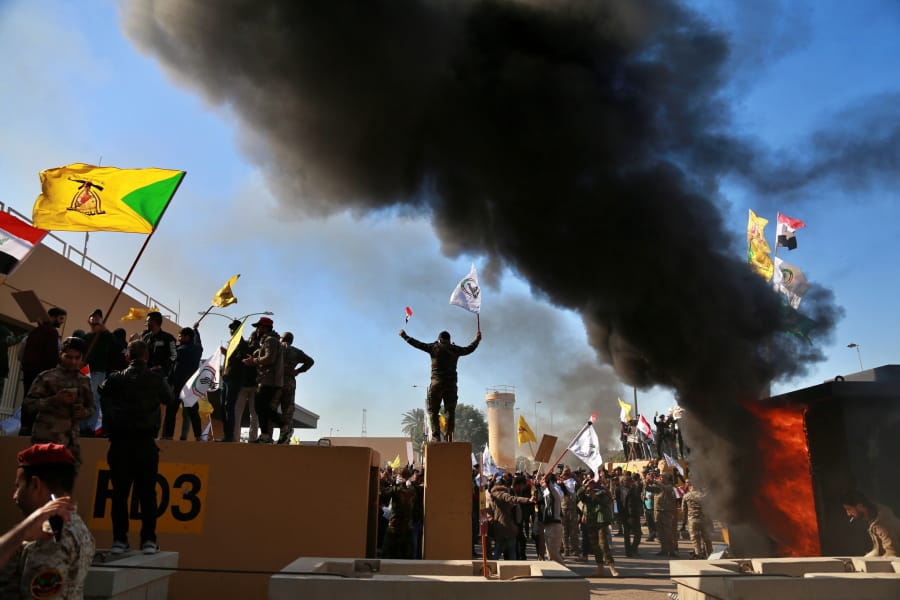BEIRUT — Iran has long sought the withdrawal of American forces from neighboring Iraq, but the U.S. killing of an Iranian general and an Iraqi militia commander in Baghdad has added new impetus to the effort, stoking anti-American feelings that Tehran hopes to exploit to help realize the goal.
The Jan. 3 killing has led Iraq’s parliament to call for the ouster of U.S. troops, but there are many lingering questions over whether Iran will be able to capitalize on the sentiment.
An early test will be a “million-man” demonstration against the American presence, called for by influential Shiite cleric Moqtada al-Sadr and scheduled fortoday.
It is not clear whether the protesters will try to recreate a New Year’s Eve attack on the U.S. Embassy compound in Baghdad by Iran-supported militias in the wake of U.S. airstrikes that killed 25 militiamen along the border with Syria. Iran might simply try to use the march to telegraph its intention to keep up the pressure on U.S. troops in Iraq.
But experts say Iran can be counted on to try to seize what it sees as an opportunity to push its agenda in Iraq, despite an ongoing mass uprising that is targeting government corruption as well as Iranian influence in the country.
“Iran is unconstrained by considerations of Iraqi sovereignty, domestic public opinion, or legality when compared to the Western democracies,” said David Des Roches, an expert with The Arab Gulf States Institute in Washington. “This is Iran’s strategic advantage; they should be expected to press it.”
Troop withdrawal
A withdrawal of U.S. troops from Iraq would be a victory for Iran, and Tehran has long pursued a two-pronged strategy of supporting anti-U.S. militias that carry out attacks, as well as exerting political pressure on Iraqi lawmakers sympathetic to its cause.
Despite usually trying to keep attacks at a level below what might provoke an American response, Iran-backed Kataib Hezbollah fired a barrage of rockets at a military base in Kirkuk in December, killing a U.S. contractor and wounding several U.S. and Iraqi troops. The U.S. responded first with deadly airstrikes on Iran-affiliated militia bases in western Iraq and Syria, then followed with the Jan. 3 drone attack that killed Gen. Qassem Soleimani, Iran’s most powerful military officer, along with Iraqi militia commander Abu Mahdi al-Muhandis as they left Baghdad’s airport.
The severity of the U.S. response surprised Iran and others, and it had the unanticipated result of bolstering Tehran’s political approach by prompting the Iraqi parliament to pass the nonbinding resolution pushed by pro-Iran political factions calling for the expulsion of all foreign troops from the country. In response, President Donald Trump has threatened sanctions on Iraq.
“What they want to do is get rid of U.S. troops in what they see as a legitimate political manner,” said Dina Esfandiary, a London-based expert with The Century Foundation think tank. “If Iraqis themselves are voting out U.S. troops, it looks a lot better for Iran than if Iran is a puppet master in Iraq trying to get rid of them — and on top of that it would be a more lasting decision.”
The legitimacy of the resolution is a matter of dispute. Not only was the session boycotted by Kurdish lawmakers and many Sunnis, but there also are questions of whether Prime Minister Adel Abdul-Mahdi has the ability to carry it out. Abdul-Mahdi resigned in November amid mass anti-government protests but remains in a caretaker role.
Pompeo rejects call
U.S. Secretary of State Mike Pompeo bluntly rejected the call for the troops’ removal, instead saying Washington would “continue the conversation with the Iraqis about what the right structure is.”
Abdul-Mahdi strongly supported the resolution, but since then has said it will be up to the next government to deal with the issue, and there are indications he has been working behind the scenes to help keep foreign troops in the country.
After closed-door meetings with German diplomats last week, German Foreign Minister Heiko Maas said the prime minister had assured them that he had “great interest” in keeping the Bundeswehr military contingent and others part of the anti-Islamic State coalition in Iraq.
The U.S., meantime, said it had resumed joint operations with Iraqi forces, albeit on a more limited basis than before.
Trump met Iraqi President Barham Saleh on Wednesday on the sidelines of the World Economic Forum in Davos, Switzerland, and said Washington and Baghdad have had “a very good relationship” and that the two countries had a “host of very difficult things to discuss.” Saleh said they have shared common interests including the fight against extremism, regional stability and an independent Iraq.



